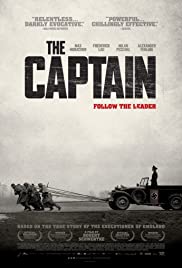
THE CAPTAIN/ DER HAUPTMANN
Germany, 2017, 118 minutes, Black-and-white/Colour.
Max Hubacher, Alexandre Fehling, Milan Peschel, Frederick Lau.
Directed by Robert Schwenke.
The Captain is an unusual World War II story. It is set in April 1945, the ending of the war.
Most audiences will have seen many films about the war and have their own perspectives about Germany, Nazism, the end of the war and the death of Hitler. This is a new angle. It is based on a true story. And it is directed by Robert Schwenke most of whose films were made in Hollywood including Flight Plan.
Max Hubacher is convincing as a young corporal who is seen fleeing from pursuers, perhaps deserting, but escaping into the forest and surviving. He then encounters a car in a ditch, the car of a Captain – and he takes his uniform, assumes his identity. Even though he is young, he knows how to imitate a German officer.
There are various difficult situations in which he finds himself, clashing with some looters, a German soldier separated from his company who gets the car out of the ditch and then accompanies the Captain, a visit to an inn where the Captain assumes the identity of an Inspector, directly commissioned by Hitler, to offer recompense to those who had been harmed by looters. Continuing his journey, he encounters a group of men with a cannon, then a group of military police, persuading everyone that he is an officer.
Ultimately, he is invited to go to a concentration camp for deserters and looters, relieving some of the officials by taking responsibility for dealing with the prisoners, including a massacre. More and more, the Captain assumes the life of an office, carousing, violently killing, ultimately the touch of debauchery with women in the village – but, with the advance of the British, he is tried by the Germans who actually praise him for his taking initiative. A final caption indicates that he was executed in May 1945, aged 21.
The film is in black-and-white, though the title, after 23 minutes, comes in red – and, a colour sequence is inserted showing the contemporary field with a concentration camp was.
1. The title? The injured captain, the young corporal taking his place? The consequences?
2. Germany, 1945, the countryside, the villages, taverns, the concentration camp and the interiors? The black-and-white photography? The glimpse of colour with the title of the film after 23 minutes? The voice-over and the glimpse of the camp location in the present?
3. True story, the young man, desperate for his life, pursued, escaping, the encounter with other deserters and looters, the chance encounter with the dead captain and the car, the encounter in the with Frayling, his assuming the identity, uniform, documents, arrogant manner, monocle…?
4. His age, the experience of the pursuit, shot at, the forest, hiding, surviving, going alone, yet transforming into the mentality of the Captain? His dealings with the soldier, Frayling, driving, going to the inn, the reaction of the locals, his explaining his mission, directly from Hitler, recompense for their troubles, the change of attitude? The meal?
5. Encounter with the soldiers with the tank, their suspicions, accusations of deserting, pulling the tank by hand? Continuing to drive, the encounter with the military police, his taking a stand, authoritarian, his documentation, defying the captain, their becoming part of his group?
6. The concentration camp, for the deserters and looters, his going to the camp with the officer, the suspicions, maintaining his identity, the subordinate officer, relieved that he was present? His taking responsibility? His ruthlessness, shooting the man inn? Gradually taking charge, the lineups, his defying the men, gatherings, the buildup to the massacre?
7. The experience going to his head, his behaviour, more and more authoritarian, violent, the ideology of Nazism, the episode with the actors and the performance, instigating the brawl, the accused men, tied together, making them run, the shooting, making the actor to shoot, the other actor killing himself, the wife of the officer also shooting?
8. The episode with the women, Nazism and the experience of debauchery, the dancing, the Captain and his defiance of one of his followers, stripping him, making him run, shooting him?
9. In the field, the gun, shooting at the aircraft?
10. The arrival of the British, his being arrested, the confusion of his interrogation, his moving to trial, the judge, the advocates, remembering their past, being lenient, praising him for his response to the situation?
11. The eventual information, his execution, age 21?
12. Audience experience of films about World War II, Nazism, April May 1945? A different perspective?